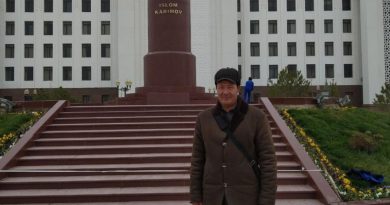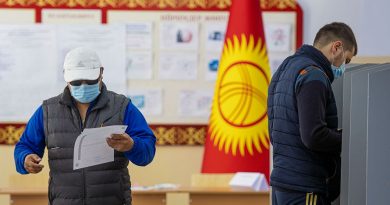Survey: Kyrgyzstan reduces compensation for human rights violations
Members of the Coalition against Torture in Kyrgyzstan did the research “Implementation of the decisions of the UN treaty bodies by the Kyrgyz Republic”. The authors of this document, Gulshaiyr Abdirasulova and Utkir Djabbarov, studied the problems of practical implementation of the decisions of the UN treaty bodies in relation to Kyrgyzstan and developed recommendations for creating an acceptable model of a national mechanism for implementing the decisions of the UN treaty bodies.
Thus, among other things, the study talks about what measures were recommended to Kyrgyzstan to implement the decisions made by the UN Human Rights Committee and the UN Committee on the Elimination of Discrimination against Women, and what measures were taken by the state in practice. In particular, the document says that the Kyrgyz Republic is extremely reluctant to pay financial compensation to citizens whose rights, according to the recognition of UN committees, have been violated.
Thus, in the case of Umetaliev and Tashtanbekova – No. 1275/2004 dated October 30, 2008 (on the murder during Aksy events of 2002), the complainants took active steps to recover compensation and bring the perpetrators to justice. A. Umetaliev appealed to the District Court of Aksy of Jalalabad region with a claim against the state for compensation for material and moral damages caused to him as a result of the death of his son E. Umetaliev in the amount of $44,470 (3.780,000 KGS) and $23,529 (2.000,000 KGS) respectively.
On July 13, 2005, the district court dismissed the claims concerning the amount of $44,470 (3.780,000 KGS), but ruled to pay $11,764 (1.000,000 KGS) as compensation for moral damage.
In the case of Moidunov and Zhumabayeva – No. 1756/2008 dated July 19, 2011, the Kyrgyz Republic stated that under Article 66 of the Criminal Code, the criminal proceedings against the defendant were terminated because the author had signed an agreement confirming that she had received compensation from the defendant in the amount of $353 (30,000 KGS) and that the case was settled.
However, the author’s lawyer considers that the amount, assessed by the domestic courts, is inappropriate. He notes that the Pervomaiskiy District Court of Bishkek, in its decision of April 29, 2015, ruled that the Ministry of Finance of the Kyrgyz Republic should pay Zhumabayeva $5,882 (500,000 KGS). On October 13, 2015, the Judicial Collegium for Civil Cases of the City Court of Bishkek (appellate instance) reduced the amount to $2,353 (200,000 KGS), without explaining the reason for its decision. On January 11, 2017, the Supreme Court of the Kyrgyz Republic confirmed the decision of the appellate instance, again without giving reasons explaining how this amount was determined and what criteria were used. The state didn’t provide the family with any other form of compensation or rehabilitation and didn’t take any measures to satisfy them.
In the case of Ernazarov – No. 2054/2011 dated March 25, 2015, the complainant’s lawyer provided the Human Rights Committee with a response on January 29, 2016, stating that “KR has demonstrated that it has not yet taken effective measures to comply with the requirements of the Human Rights Committee on the investigation into the death of Ernazarov and the provision of compensation to his family.”
While this response mentions a number of legislative and institutional reforms, including the establishment of the Human Rights Coordinating Council on November 18, 2013, as well as further proposed reforms outlined in the National Action Plan for the Prevention of Torture, which are welcome, many of the reforms remain to be done; torture remains widespread and impunity for the perpetrators too.
“The work that is currently being carried out by the Human Rights Coordinating Council to develop a mechanism for implementing the decisions of the Human Rights Committee is also welcome. The author’s lawyer calls on the Committee to support this. However, the absence of such a mechanism shouldn’t be an obstacle to the implementation of the decisions of the Committee regarding Ernazarov,” the authors of the study note.
As noted in the document, in the case of Ernazarov, by the decision of the Supreme Court of the Kyrgyz Republic dated October 19, 2020, $ 3,529 (300,000 KGS) was recovered from the state.
In Akmatov’s case – No. 2052/2011 dated October 29, 2015, by the decision of the Pervomaiskiy District Court of Bishkek dated October 16, 2018, 200,000 KGS were recovered. By the decision of the Supreme Court of the Kyrgyz Republic dated July 24, 2019, the decision of the court of first instance was upheld.
In the case of Nazaraliev – No. 2697/2015 dated July 05, 2019, it’s noted that the prosecution authorities refused to reopen the case in connection with the destruction of materials. By the decision of the Pervomaiskiy District Court of Bishkek dated February 24, 2021, 50,000 KGS were recovered. The judges decided that it was sufficient compensation for the torture.
In Gorbaeva’s case – No. 133/2018 dated November 03, 2020, the lawyer of the complainant filed a lawsuit for $117,647 (10.000,000 KGS) against the Ministry of Finance of the Kyrgyz Republic. In November 2021, it became known that the court only partially satisfied the woman’s application and ruled to pay her $88 (50,000 KGS), that is, 200 times less than it was stated in the claim.
It’s worth recalling that Roza Gorbaeva spent more than three years, while the investigation and trials were going on, in six different temporary detention centers in different cities, despite the fact that the law allows keeping suspects in temporary detention centers for only 48 hours. The detention of Gorbaeva in these temporary detention centers “degraded her human dignity, was equal to cruel inhuman treatment and was of a discriminatory nature”. The UN Committee on the Elimination of Discrimination against Women, after considering the application of the Kyrgyz woman, recognized the fact of discrimination against her and demanded that the government of Kyrgyzstan provide her with appropriate compensation.
/wp




